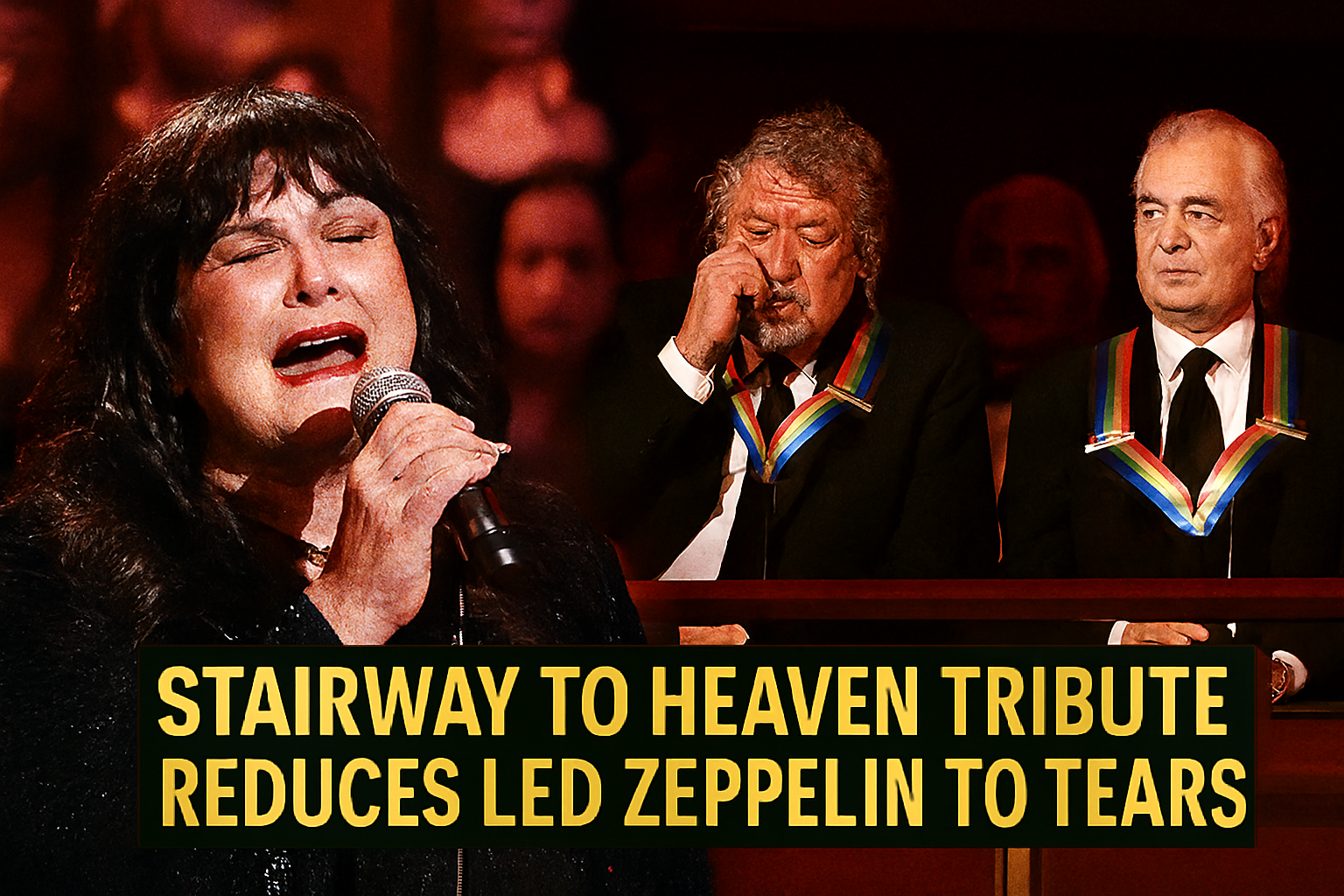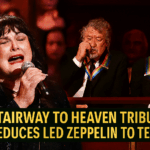Ann Wilson’s performance of “Stairway to Heaven” at the 2012 Kennedy Center Honors became one of the most emotionally resonant tributes in rock history, moving Led Zeppelin’s surviving members to tears and uniting generations through music.
A Tribute Transcending Time
On December 2, 2012, the Kennedy Center Honors paid tribute to Led Zeppelin, celebrating their profound impact on American culture. Among the evening’s performances, one stood out as transcendent: Ann Wilson of Heart, joined by her sister Nancy and drummer Jason Bonham, delivered a soul-stirring rendition of “Stairway to Heaven” that left the audience breathless and the honorees visibly moved.
From the first line, Wilson’s voice carried a haunting clarity that filled the vast hall. Her delivery was reverent yet powerful, drawing every eye toward the balcony where Robert Plant, Jimmy Page, and John Paul Jones sat in quiet awe. The performance wasn’t just a cover—it was a spiritual offering, a moment where music became memory, emotion, and legacy all at once.
Jason Bonham’s Symbolic Role
The tribute gained even deeper meaning when Jason Bonham, son of the late Led Zeppelin drummer John Bonham, took his place behind the drum kit. His presence bridged past and present, adding a layer of emotional gravity that resonated with both the performers and the audience. As he played, it felt as though his father’s spirit was part of the moment, anchoring the performance in familial and musical continuity.
Bonham’s drumming was restrained yet powerful, echoing his father’s style while honoring the song’s delicate dynamics. His inclusion wasn’t just symbolic—it was essential, grounding the tribute in authenticity and lineage.
The Choir’s Climactic Power
As the song progressed, a full gospel choir joined the stage, elevating the arrangement to cinematic heights. Their harmonies added a celestial dimension, transforming the performance into something almost sacred. The choir’s voices soared, blending seamlessly with Wilson’s lead and Bonham’s rhythm, creating a wall of sound that enveloped the hall.
At the song’s peak, the choir’s energy surged, and the music swelled with emotional intensity. The arrangement built slowly, respecting the original’s structure, but added layers of depth that made it feel fresh and monumental. It was a masterclass in tribute performance—respectful, innovative, and deeply felt.
Robert Plant’s Tears
Perhaps the most unforgettable moment came when Robert Plant, known for his stoic demeanor, was seen wiping away tears. As the final notes rang out, the weight of the tribute seemed to settle over him. It was a rare glimpse into the vulnerability of a rock icon, moved not by nostalgia alone, but by the sheer beauty and sincerity of the performance.
Plant later admitted that he usually disliked covers of “Stairway to Heaven,” but this one was different. It captured the spirit of the original while offering something new—an emotional truth that transcended technical perfection.
The Wilson Sisters’ Connection to Zeppelin
Ann and Nancy Wilson had long admired Led Zeppelin, and their band Heart was deeply influenced by the group’s sound and ethos. Their ability to channel Zeppelin’s energy while maintaining their own identity made them ideal performers for the tribute. Nancy’s guitar work was precise and emotive, while Ann’s vocals carried the emotional weight of the song with grace and power.
Their connection to the material was evident in every note. This wasn’t just a performance—it was a love letter to the music that shaped them, delivered with reverence and passion.
Cultural Impact and Legacy
The Kennedy Center performance quickly went viral, garnering millions of views and widespread acclaim. It’s now considered one of the greatest live tributes in rock history, often cited as a benchmark for how to honor musical legends. The moment captured the essence of Led Zeppelin’s legacy while showcasing the enduring power of their music to move and inspire.
For younger audiences, it served as an introduction to the emotional depth of classic rock. For longtime fans, it was a reminder of why Zeppelin mattered—and still does. The performance bridged generational divides, proving that great music transcends time and context.
Final Reflection
Ann Wilson’s “Stairway to Heaven” wasn’t just a tribute—it was a moment of collective catharsis. With Jason Bonham behind the drums, a gospel choir lifting the melody, and the Wilson sisters channeling decades of admiration, the performance became a living monument to Led Zeppelin’s legacy.
Robert Plant’s tears said it all: this was more than music. It was memory, emotion, and reverence wrapped in sound. And for everyone who witnessed it—whether in the hall or through a screen—it remains a reminder of how deeply music can touch the soul.










